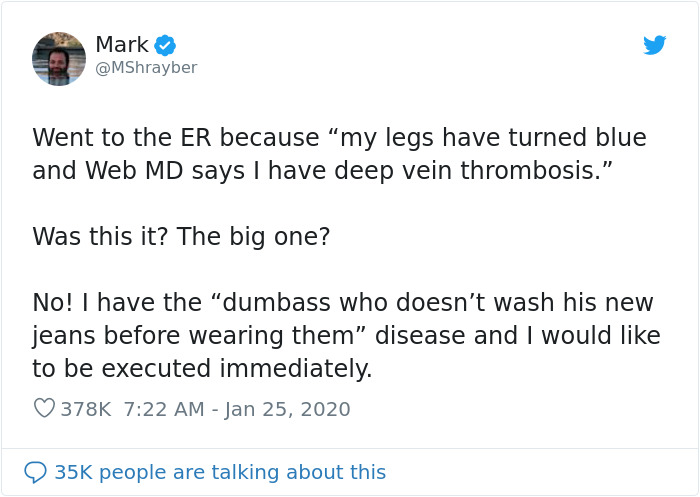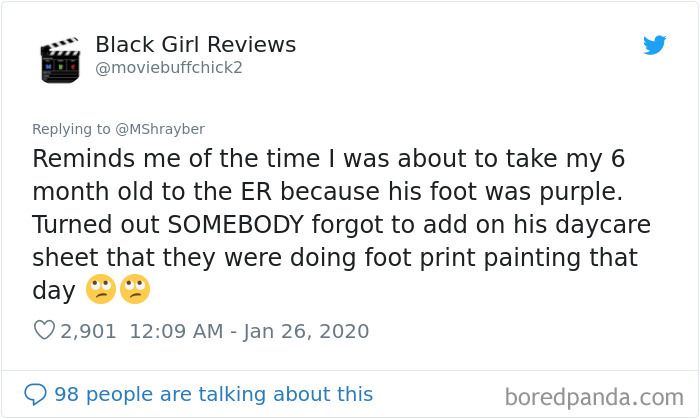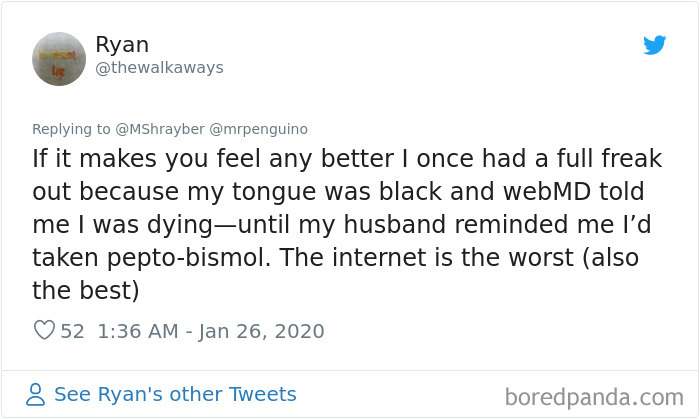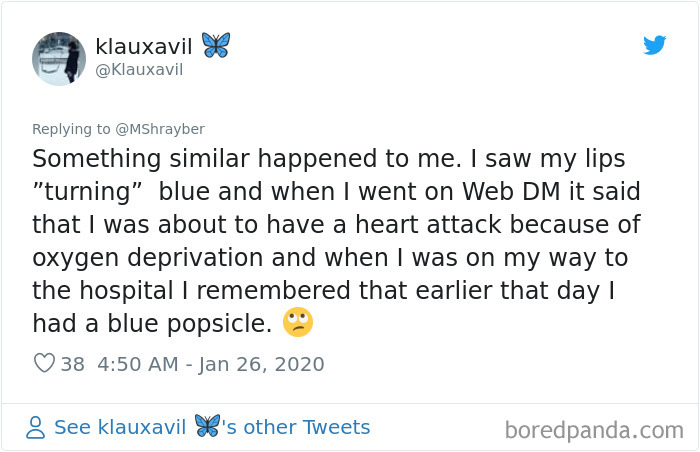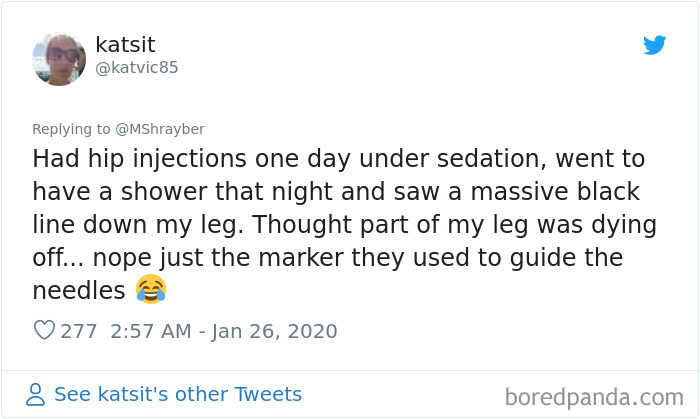It’s incredibly easy to freak out about your health. A slight cough. A tiny bump. A strange rash. Even feeling slightly off-key. All of these things can force even grownups (or was that especially grownups?) to panic. Even more so if they start googling their symptoms.
When Twitter user Mark shared his personal embarrassment after he went to the ER when his leg turned blue from his jeans, others joined in with their own medical freak-out stories. We’ve collected some of the best, so scroll down, upvote your faves, and read on for Bored Panda’s in-depth interview with a psychologist. And be sure to share your own moments of panicking about your health in the comments.
Listen beautiful relax classics on our Youtube channel.
After you’re done reading through this post (which, hopefully, helped you calm down), have a read through our article about one mom’s post going viral after she explained the importance of having your sick kids stay at home. Oh, and check out our post about the most absurd patient stories.
Image credits: MShrayber
#1
Image credits: SLHDC
#2
Image credits: KaraNextWeek
#3
Image credits: ImplodedView
While the internet is wonderful (it’s full of pictures of cats and dogs, after all), it’s not a very nice place for hypochondriacs—people who excessively worry about their health. It’s incredibly easy to read too much into your symptoms and make mountains out of molehills.
Most of us have fallen prey to this at least once or twice in our lives, even if we’re not hypochondriacs. Human beings tend to look at the worst in most situations, so when we see that our symptoms may be caused by cancer, we immediately fear the worst.
This leads to lots of stress, sleepless nights, promises to be better people and trying to make amends. Then we head on over to the doctor, they tell us that we’ve got a slight cold or something utterly benign. We finally relax and forget our promises to be better people. Until the next time that we open up Web MD that is.
#4
Image credits: moviebuffchick2
#5
Image credits: JenProuty
#6
Image credits: thewalkaways
Listen beautiful relax classics on our Youtube channel.
Bored Panda reached out to M.V., a psychologist working in the healthcare system in Lithuania, to hear her professional opinion about hypochondria and why some people tend to panic when checking what their symptoms might mean online.
“First of all, when people read about symptoms on the internet, they exhibit 2 fallacies: they personalize the information they get and they draw conclusions too quickly.”
She continued and explained exactly what she meant about personalization. “Firstly, when a person feels pain and other unpleasant sensations and doesn’t know what causes them, they feel anxious. That’s why they try to find a logical explanation for what’s happening and how they can feel better.”
“That’s why they become open to any and all information. When they read information online, their anxiety won’t let them rationally evaluate the situation. They become suggestive. You can see that in how some of the symptoms manifest only after reading them.”
#7
Image credits: thetidebreaks
#8
Image credits: itsnottuesday
#9
Image credits: kateraider
The psychologist then told Bored Panda about the problem with making hurried conclusions. “When a person applies an illness’ symptoms to themselves, they tend to make hurried conclusions and either accept or reject the fact that they have a particular illness. Often, after personalization comes confirmation when one’s imagination creates a dreary scenario of how the supposed illness will progress. This further encourages people to read about that specific illness and its harm to the human body.”
“When someone hoards information about an illness, they also imagine what it will be like living with the illness. Most often, the person imagines losing their health and starts feeling very strong negative emotions. That leads to a fear of death which even further reduces their ability to rationally evaluate their condition.”
She added: “It’s likely that destructive emotions only accelerate how quickly the person shows symptoms. The person feels bad and might even feel worse until their understanding of the illness is denied in an objective manner (i.e. consulting a doctor or having tests done).”
#10
Image credits: annamaria1word
#11
Image credits: Klauxavil
#12
Image credits: JCC_72
The psychologist told Bored Panda about the proper way to deal with panic upon reading too many terrifying descriptions of what your symptoms might mean. “First of all, you should evaluate the reasons for your symptoms and monitor how you feel until you meet with your doctor. You also ought to critically assess all of the health-related information you get from your surroundings (including your family members and friends) and the internet.”
“You should also avoid coming to hurried conclusions on the basis of just your symptoms since similar symptoms could point to very different health problems. Also, remember that diagnoses should only be made based on test results conducted by doctors.”
#13
Image credits: HsvBootCamp
#14
Image credits: susankamppi
#15
Image credits: drowsyfire
Ironically, Web MD agrees with the conclusion that the internet exacerbates hypochondria. Talk about being self-aware! “Hypochondriacs researching an illness used to have to scour books and ask doctors for information. Now a universe of information is available with a few mouse clicks.”
According to Dr. Brian Fallon, a professor of psychiatry at Columbia University, hypochondria costs billions of dollars each year in unnecessary medical tests and treatments.
Meanwhile, Dr. Arthur Barsky from Harvard Medical School states that hypochondriacs aren’t pretending to get attention. “They’re absolutely not fakers or malingerers. They really feel the distress they’re talking about. It’s just that their feelings don’t have an obvious medical basis.”
“What hypochondriacs have trouble accepting is that normal, healthy people have symptoms,” Barsky explained. That means that hypochondriacs are super-aware of bodily sensations that most of us either live with or ignore. So what an upset stomach or a headache is to most of us, to a hypochondriac, they’re signs of cancer.
#16
Image credits: KGSchn
#17
Image credits: colinmcgovernpm
#18
Image credits: HeauxP
#19
Image credits: brianchiong
#20
Image credits: pintsizedMB
#21
Image credits: tamrmint
#22
Image credits: MistletoeCrow
#23
Image credits: NewtiaofTarth
#24
Image credits: MinervaAthena81
#25
Image credits: xcannedx
#26
Image credits: keith_pochick
#27
Image credits: AmmoniteInk
#28
Image credits: corneilius
#29
Image credits: katvic85
#30
Image credits: fitserbmomma
#31
Image credits: lovejanelleyy
#32
Image credits: SharonH1892
#33
Image credits: freiberg3
#34
Image credits: kermelbar
#35
Image credits: lovelylippie21
Source: boredpanda.com
